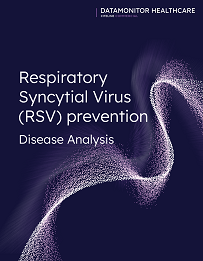Report Library
All Reports
Datamonitor Healthcare Infectious Diseases Disease Analysis: Respiratory Syncytial Virus (RSV) Prevention
November 03, 2025
The RSV prophylaxis market is expected to expand rapidly over the next 10 years following the approval of AstraZeneca/Sanofi’s Beyfortus (nirsevimab), as well as the launches of the Arexvy (GSK) and Abrysvo (Pfizer) vaccines from the 2023/24 season and mRESVIA (Moderna) from the 2024/25 season. The RSV pipeline remains active with vaccines being developed for the three major risk groups, namely the elderly, infants and pregnant women (to protect infants via passive transfer of neutralizing antibodies across the placenta).
Abrysvo has become the first vaccine to be approved for maternal immunization, gaining US and EU approval in August 2023 for passive protection against LRTD in infants following maternal immunization during pregnancy. Approval was based on results from the Phase III MATISSE trial which showed that Abrysvo administration in pregnant women helped protect infants from RSV disease after birth, with 81.8% observed efficacy for severe medically attended LRTI through the first 90 days of life. Novavax and GSK previously had vaccine candidates in this space; however, Novavax’s ResVax missed its primary efficacy endpoint in the pivotal Phase III PREPARE study and development is no longer being pursued by the company, while GSK halted development of GSK-3888550A during Phase III trials following safety concerns. It is also unlikely that Arexvy will be pursued for use in infants as the FDA has determined that administration could be unsafe in the pediatric population due to an increased risk of enhanced respiratory disease that was shown in animal models.
| Indications Covered: | Respiratory Syncytial Virus (RSV) Prevention |
